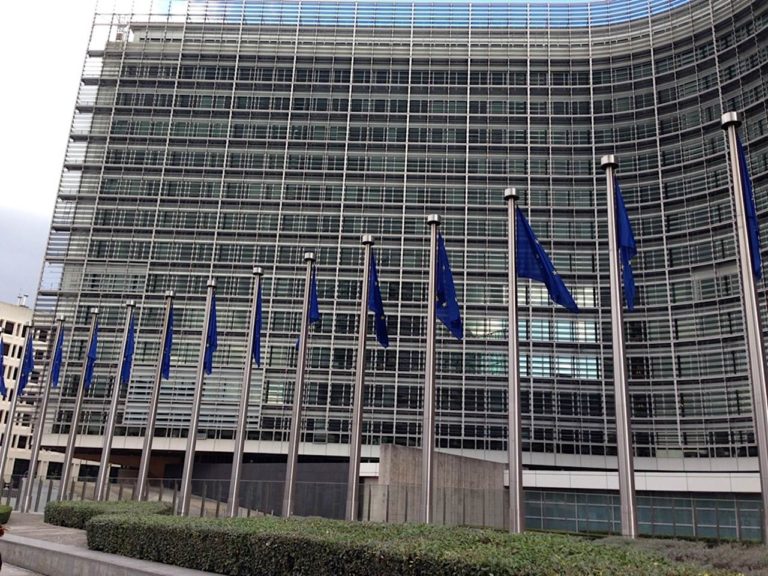Highlights from the Past Weeks
CW 36 / Monday, 5 to Thursday, 8 September: Political Group and Committee Meetings Week (Brussels);
CYBER RESILIENCE ACT – RELEASE OF COMMISSION PROPOSAL: This week, the EU Commission intends to present the Cyber Resilience Act (CRA). The draft of the CRA (PDF) has already been leaked to the public a few days earlier.
The Commission’s new proposal for a Cyber Resilience Act will mandate baseline cybersecurity standards for all connected devices. The initiative, the first of its kind in the world, aims to address the widespread and interconnected vulnerabilities in the Internet of Things (IoT). It also wants to impose conformity assessments by manufacturers, security criteria in the design, development and manufacturing of devices, and penalties of either 15 million Euro or up to 2.5% of annual turnover.
The Commission has adopted a risk-based approach, with stricter conformity assessment procedures for the so-called critical products. For the highest security level, a third-party assessment is required to demonstrate compliance with a governance structure based on the new regulatory framework. In addition, the Commission will be empowered to adopt secondary legislation to update mandatory EU cybersecurity certification schemes for “highly critical” products. (see Euractiv)
EUROPEAN MEDIA FREEDOM ACT – LEAKED COMMISSION PROPOSAL: This week, the Commission also intends to present the European Media Freedom Act (EMFA). The draft EMFA (PDF) was also leaked a few days earlier.
The Media Freedom Act addresses the issues of media regulation, editorial independence and economic revenues, but omits the topic of media ownership. The proposal provides for the establishment of a media committee – the expanded successor to the ERGA – which will mandate transparency and objectivity in the allocation of public funds to media companies and introduce several safeguards for public service media providers.
In addition, the leaked draft cites a measure whereby very large online platforms, under the DSA, will have to justify content moderation decisions in relation to editorial content, giving publishers the option of what is seen as an amicable solution. (see Euractiv)
INFRASTRUCTURE CHARGES – CONSULTATION IN Q1/2023: Internal Market Commissioner Thierry Breton confirmed last week that a broad consultation on whether technology companies should contribute to the cost of telecoms networks will take place in the first half of 2023. This is to be followed by a legislative proposal. (see Reuters)
ARTIFICIAL INTELLIGENCE I – JURI COMMITTEE ADOPTS OPINION: The AI Act opinion report was adopted last week in the JURI Committee (17 to 1). It proposes three new exemptions from the scope of the legislation, namely on research and development, B2B low-risk industrial applications, and open source systems until their commercialisation. The Legal Affairs Committee also introduces substantial changes in the responsibilities of providers and users and the provisions related to general purpose AI, based on the definition provided by the French Presidency. In addition, the AI Board was enhanced and the Commission would have to evaluate after three years if an EU agency is needed. In the human oversight article, a mention was added that the persons in question would need to be “AI literate”. Other highlights involve provisions on transparency, risk management and harmonised standards. (see Euractiv)
ARTIFICIAL INTELLIGENCE II – COUNCIL WITH NEW PROPOSALS: Meanwhile, the Slovak Presidency is conducting a series of expert-level workshops on the AI Act and has presented a number of proposals on the AI Act. The first workshop took place this week and focused on the governance of AI regulation.
Bratislava pitched the idea of moving away from traditional institutional structures in favour of “novel virtual collaborative teams” to “mirror the degree of technological convergence and integration”. Slovakia also proposed establishing a real-time helpdesk set up on a common communication platform that would provide continuous support for Member State authorities on the legislative interpretation and technical assessment. Finally, the Slovak ministry suggested the introduction of co-regulatory dialogues between the providers of general purpose AI systems, the AI Board and the European Commission, proposing to delegate powers to the Commission similar to those it has for only very large platforms under the DSA. (see Euractiv)
DATA ACT I – LEGISLATIVE COMMITTEE WITH FIRST EXCHANGE OF OPINIONS AND TIMELINE: The Legal Affairs Committee (JURI), an associated committee for the Data Act, held a first exchange of opinions on the proposal on 5 September 2022. The provisional timetable for the relevant work was published in the course of this exchange.
According to the provisional timetable, rapporteur I. García del Blanco (S&D, Spain) intends to finalise the draft opinion in time to present it to the Committee for discussion, either on 26 or 27 October.
MEPs would then have until 8 November to table amendments to the text, with the Committee then likely to subsequently vote on the amendments and the draft opinion in January 2023.
DATA ACT II – DRAFT REPORT IN THE INDUSTRY COMMITTEE: Meanwhile, lead rapporteur P. del Castillo announced that her draft report had been submitted for translation.
Del Castillo told Politico Pro (paywall) that, in requiring companies to share data with states, she had sought to clarify the difference between public emergencies where companies are not entitled to compensation, and exceptional exigencies where compensation is possible.
One of the most important issues Del Castillo encountered during her work, she said, was how to accommodate the user’s right to access their own data while ensuring that “investments, intellectual property or trade secrets are not compromised”. According to Del Castillo, metadata should be included, but at the same time, challenging processed data should be excluded.
DIGITAL SERVICES AND DIGITAL MARKETS ACT – PARLIAMENT DISCUSSES POSSIBILITY OF A WORKING PARTY: Leading MEPs A. Schwab and C. Schaldemose are considering setting up a working party to monitor the transposition of the DMA and the DSA. The initiative will land on the coordinators’ table in the Internal Market Committee (IMCO) on Monday and is intended to employ leverage on the Commission in the crucial months before the new legislation comes into force. (see Politico Pro, paywall and Euractiv)
ONLINE POLITICAL ADVERTISING I – EU COUNTRIES OPEN TO MORE RESTRICTIONS: In its draft regulation, the Commission proposed a ban on political parties from targeting voters on social media platforms with advertising based on sensitive information such as religious beliefs, health data and sexual orientation. However, the EU Executive also proposed exemptions from this ban: If platforms seek people’s consent, the ban would no longer apply.
While Germany is backing a general ban on using personal data for targeting, amplification and ad delivery for political ads, Poland wants a ban on targeted political advertising based on sensitive data.
Other countries such as Belgium and Estonia advocate tightening the grip on profiling for political advertising. “We would support introducing further restrictions on the more problematic profiling techniques,” Estonian officials wrote. Hungary, for its part, “seriously” doubts that the regulation has the correct legal basis and does not want a regulation. (see Euractiv)
ONLINE POLITICAL ADVERTISING II – LIBE COMMITTEE BEGINS WORK: MEPs in the Civil Liberties Committee (LIBE) began discussions last week on the legislative proposal concerning online political advertising. The committee has exclusive competence for the data protection aspects of the act, which aims to curtail online manipulation, especially in the run-up to elections. Together with the lead Internal Market Committee (IMCO), it will also look at transparency and definitions in the law.
IMCO rapporteur A. Donáth, meanwhile, hopes to reach an agreement by the end of the month. Two political meetings are planned for this week.
Donáth sees the main points of negotiation as the following:
A possible ban on micro-targeting political advertising: Donáth has argued that online platforms should no longer be allowed to display political advertising based on profiling and tracking people online. Political parties could, however, target voters through online ads based on data they themselves share. Most left-oriented parties – including the S&D, the Greens and The Left – are in favour of the ban on microtargeting for political advertising.
More centralised European enforcement: Renew wants to empower the European Data Protection Board to launch investigations against very large online platforms and search engines. (see Politico Pro, paywall)
PRODUCT SAFETY – 4 COLUMN DOCUMENT BEFORE START OF TRILOGUE: Trilogue negotiations on the General Product Safety Regulation are due to begin this week. In the run-up, a 4-column document (PDF) with the baseline situation has been published.
GLOBAL MINIMUM TAX – ROLE CHANGE AT THE OECD: Pascal Saint-Amans announced last week that he would leave his post as Director of the OECD’s Centre for Tax Policy and Administration.
For many years now, Saint-Amans had been leading the development of regulations such as a global minimum tax rate for companies and a new tax on multinationals. Concerns are now mounting that, with Saint-Amans’ departure, the package could stall at a critical point.
The EU is struggling to reach unanimous agreement on the minimum corporate tax rate, while Republicans in the US are contesting the global reform plan.
GERMANY – STRATEGY FOR RESILIENT TELECOMMUNICATIONS NETWORKS: The German Federal Network Agency (BNetzA) has published a strategy paper for resilient telecommunications networks coordinated with the Federal Ministry of Digital Affairs and Transport (BMDV) and the Federal Office for Information Security (BSI). It is targeted “primarily at operators of telecommunications networks and providers of telecommunications services”. The goal is to ensure that the communication infrastructure remains stable and operational in the event of crises and disasters.
Furthermore, suggestions are made as to how the security of the networks can be technically strengthened. However, in the view of the Network Agency, not only should each operator take individual measures, but an overall strategy for the resilience of the telecommunications infrastructure should be developed and overarching measures such as the establishment of a situation centre by network operators and authorities should be promoted.
Relevant Publications, including from the EP Think Tank:
- The six policy priorities of the von der Leyen Commission: State of play in autumn 2022 (In-Depth Analysis)
- Policy Departments’ Monthly Highlights – August 2022 (At a Glance)
- Fit for 55 package: Energy Efficiency Directive (At a Glance)
- Fit for 55 package: Renewable Energy Directive (At a Glance)
- Revising the Energy Efficiency Directive: Fit for 55 package (Briefing)
Outlook for the Current Week
You can find a list of the upcoming dates of the European Parliament here. The meeting calendar for 2022 can be found here (PDF). The overview of the agenda for the plenary session can be found here.
On Wednesday morning, Commission President von der Leyen will give her State of the Union address. As early as Monday evening, the Internal Market Committee will vote (again) on the DSA – in a “cleaned up” or corrected version by the language lawyers (PDF).
An overview of the most important dates of the Council week can be found here and the meeting calendar can be accessed here. You can access the official calendar of the Czech Presidency here (PDF).
Included among these dates are:
Summits and Ministerial Meetings:
- Informal Meeting of Agriculture and Fisheries Ministers, Wednesday, 14 to Friday, 16 September;
Preparatory Bodies:
- Working Party on Tax Questions (Indirect Taxation) (incl. energy), Monday, 12 September and Thursday, 16 September;
- Audiovisual Working Party (incl. measures against RT, Sputnit et al.), Monday, 12 September;
- Working Party on Competitiveness and Growth (Industry) (incl. Chips Act), Monday, 12 September;
- Working Party on Judicial Cooperation in Criminal Matters (COPEN) (incl. e-Evidence), Tuesday, 13 September, Thursday, 15 September and Friday, 16 September;
- Working Party on Consumer Protection and Information (incl. Consumer Credits), Tuesday, 13 September and Friday, 16 September;
- Working Party on Telecommunications and Information Society (incl. eID, AI, Data Act), Tuesday, 13 September and Thursday, 15 September;
- Horizontal Working Party on Cyber Issues, Tuesday, 13 September and Friday, 16 September;
- Gruppe Wettbewerbsfähigkeit und Wachstum (Binnenmarkt), Freitag, 16. September;
- Working Party on Competitiveness and Growth (Internal Market), Friday, 16 September;
- COREPER I, Wednesday, 14 and Friday, 16 September;
- COREPER II, Wednesday, 14 September;
Information on the weekly Commission Meeting can be found in the preview (PDF) or (at short notice) in the current agenda.
The following topics are on the agenda for the coming week:
- Forced labour products ban
- Single market emergency instrument
- European Cyber Resilience Act
- European Media Freedom Act
You can find the judicial calendar of the ECJ here. Several dates in September are dedicated to the GDPR (see GDPR Beetle):
- On 20 September, the rulings will be delivered on the Spacenet data retention case (C-793/19 & C-794/19) and VD & SR (C 339/20 & C-397/20), and the Attorney General will deliver an opinion on whether the GDPR prevents the German competition authority from assessing whether Meta’s data processing is compatible with the GDPR (C-252/21).
- 22 September will see another opinion of the Advocate General on Article 88 of the GDPR, which deals with the question of whether the national law protecting the processing of personal data is applicable if the law does not meet the requirements of Article 88 (C-34/21).
European Parliament Committees
CW 37 / Monday, 12 to Thursday, 15 September: Plenary Sessions Week (Strasbourg);
LIBE Committee (Civil Liberties)
Current Meetings
- None
Further Meetings (Calendar)
- Monday, 10 October 2022, 15.00-18.30 (Brussela)
- Tuesday, 25 October 2022, 14.30-18.30 (Brussels)
JURI Committee (Legal Affairs)
Current Meetings
- None
Further Meetings (Calendar)
- Monday, 3 October 2022
Dossiers Timetable (2 September 2022)
ITRE Committee (Industry)
Current Meetings
- None
Further Meetings (Calendar)
- Monday, 26 September 2022, 15.00-18.30 (Brussels)
Dossiers Timetable (30 August 2022)
IMCO Committee (Internal Market)
Current Meetings
- Monday, 12 September, 19.00-20.30 (Strasbourg)
Excerpt from the draft agenda
…
*** Electronic vote***
- Single Market For Digital Services (Digital Services Act) and amending Directive 2000/31/EC
***I 2020/0361(COD) COM(2020)0825 – C9-0418/2020
* Vote of a corrigendum (Rule 241)
…
- Amending Regulation (EU) No 910/2014 as regards establishing a framework for a European Digital Identity
IMCO/9/06237
***I 2021/0136(COD) COM(2021)0281 – C9-0200/2021
| Rapporteur for the opinion: | |||
| Andrus Ansip (Renew) | PA – PE704.865v01-00 AM – PE731.599v01-00 |
||
| Responsible: | |||
| ITRE* | Romana Jerković (S&D) | PR – PE732.707v01-00 AM – PE734.285v01-00 AM – PE734.286v01-00 |
|
Adoption of draft opinion
*** End of electronic vote ***
…
Further Meetings (Calendar)
- Monday, 12 September, 19.00-20.30 (Strasbourg)
Dossiers Timetable (July 2022)
CULT Committee (Culture)
Current Meetings
- None
Further Meetings (Calendar)
- Monday, 3 October 2022 (Strasbourg)
PEGA Committee (Pegasus Committee of Inquiry)
Current Meetings
- Thursday, 15 September 2022, 9.00-12.00 (Strasbourg)
Excerpt from the current agenda
Hearing: The use of spyware in Poland
Further Meetings
- Open
INGE2 Committee (Special Committee on Foreign Interference)
Current Meetings
- None
Further Meetings (Calendar)
- Thursday, 29 September 2022, 9.00-12.30 (Brussels)
Further Parliamentary Calendar Dates
- CW 38 / Monday, 19 to Friday, 23 September: Green Week (no meetings);
- CW 39 / Monday, 26 to Thursday, 29 September: Political Group and Committee Meetings Week (Brussels);
- CW 40 / Monday, 3 to Thursday, 6 October: Plenary Sessions Week (Strasbourg);




